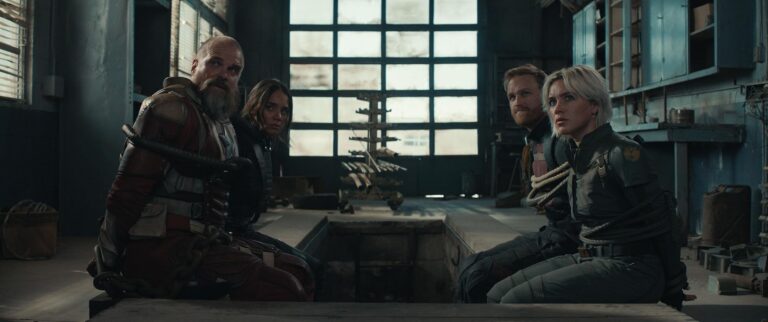Marvel’s latest entry, Thunderbolts*, arrives at a strange crossroads for the MCU. Once the most reliable engine in modern blockbuster filmmaking, the franchise has lost momentum in the past several years, sputtering through overcrowded narratives and tonal sameness. Rather than ignore that decline, Thunderbolts* instead seems to lean into it, fashioning a story about instability and disillusionment, and the difficult process of starting over — themes that apply not just to its characters, but to Marvel itself.
The basic setup finds Florence Pugh’s Yelena Belova — grieving the loss of her sister and stuck cleaning up messes for CIA director Valentina Allegra de Fontaine (Julia Louis-Dreyfus) — forced into an uneasy alliance with other morally grey super-operatives under Val’s command. Among them: Wyatt Russell’s tightly coiled John Walker (last seen in The Falcon and the Winter Soldier), Hannah John-Kamen’s Ghost (absent from the MCU since 2018’s Ant-Man and The Wasp), and David Harbour’s wonderfully unfiltered Russian superhero Alexei Shostakov, the Red Guardian.
It’s a familiar premise — we’ve seen disparate personalities thrown into life-or-death situations plenty of times before — but what sets Thunderbolts* apart is a commitment to the emotional lives of its characters. This isn’t a film obsessed with cosmic stakes, it’s a film about second chances. Not grand, redemption-through-self-sacrifice hero arcs, but quieter, more human attempts at reassembly: people trying to move past guilt or cope with emotional fatigue. The protagonists are former villains, antiheroes, and ideological cast-offs, the sort of figures who once filled the margins of other Marvel stories, now shoved together with no clear directive other than survival. Their alliance isn’t built on chemistry or even common purpose, but on a shared sense of exhaustion and aimlessness.
It’s a surprisingly honest depiction of where the Marvel Cinematic Universe finds itself. For years, these films ran on certainty, with every narrative beat calibrated to fit into a larger, invincible machine. But Thunderbolts* refuses that comfort; there’s doubt in its characters and a vulnerability that feels radically different from the breezy, quippy invincibility of earlier Avengers outings. Director Jake Schreier (Netflix’ Beef) and screenwriters Eric Pearson (Thor: Ragnarok, Black Widow) and Joanna Calo (The Bear, BoJack Horseman) clearly understand that the superhero genre’s greatest untapped resource might be its emotional fallout.
To that point, the film’s emotional weight rests heavily on Florence Pugh, who remains one of the MCU’s best casting decisions. Her Yelena is as dryly funny and combat-capable as ever, but there’s a growing weariness to her portrayal. She isn’t just a snarky assassin with trauma baggage; she’s wrestling with existential drift, the kind of emotional wounds that superpowers can’t cauterize. Joining her is Lewis Pullman as Bob, a mysterious figure whose superhuman capabilities mask a profound psychological fragility. Pullman’s performance is unexpectedly tender, anchoring some of the film’s most thematically ambitious moments, and his dynamic with Pugh is one of the film’s most rewarding surprises.
The rest of the ensemble fares well, even if some characters feel more like sketches than fully realized portraits. Wyatt Russell leans into Walker’s prickly arrogance with conviction, and David Harbour once again brings a hefty amount of charisma to Red Guardian. His deadpan and often hilariously bleak delivery — at one point he tells Yelena “the light inside you is dim, even by Eastern European standards” — works in tandem with moments of genuine warmth; there’s a sincerity and earnestness to Alexei that feels energizing. Other characters are given less to do — Hannah John-Kamen’s Ghost feels particularly underserved, to say nothing of another returning character with probably less than five minutes of screentime — and the dynamic between them doesn’t always cohere, but that friction feels largely intentional.
Visually, Thunderbolts* also marks something of a shift. Cinematographer Andrew Droz Palermo (The Green Knight) lends the film a grittier, more tactile aesthetic than Marvel’s typical digital gloss, and there’s a surprising and welcome reliance on practical, in-camera effects, as evidenced by a recent behind-the-scenes video Schreier posted to his personal Instagram account.
What holds Thunderbolts* back from being a complete triumph is a familiar MCU issue: the strain between innovation and obligation. The film clearly wants to explore themes of grief, identity, and recovery in ways that are more grounded than the average superhero flick, but at times it feels compelled to rush through those insights, settling for broad strokes instead of nuance. Still, for all its unevenness, the film succeeds at what so many recent Marvel entries have failed to do: it feels like it was made by people, not a pipeline.
With two massive crossover events looming on the horizon — the first of which is already in production — Marvel is unlikely to stay in this space for long. But in a franchise increasingly defined by diminishing returns and fan service fatigue, Thunderbolts* offers a rare moment of self-reflection, and a detour that feels meaningful in a way that most MCU films haven’t felt in years.

